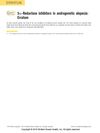
Search
for
Sort by
Research
630-660 / 1000+ results

research Pellagra and Anorexia Nervosa: A Case Report
A woman with anorexia nervosa improved after treatment for pellagra, reminding doctors to check for this deficiency in patients with eating disorders.

research Polycystic Ovary Syndrome: Insight Into Pathogenesis and a Common Association With Insulin Resistance
Improving insulin sensitivity and weight loss can help manage polycystic ovary syndrome (PCOS).

research Hair Cosmetic Alterations
The document concludes that individualized treatments for hair issues are effective, certain hair changes can indicate neurocutaneous diseases, specific lotions improve skin health, laser hair removal works but needs more study on long-term effects, men's cosmetics are diverse, peeling is effective but can have side effects, and facial pigmentation is often due to overactive skin cells.

research Hair Abnormalities and Neurological Disease
Hair changes could indicate neurological diseases and help monitor treatment.

research Follow-Up of Nutritional and Metabolic Problems After Bariatric Surgery
Patients need long-term care after bariatric surgery to manage potential nutritional and metabolic issues.

research Hair Growth After Gefitinib Treatment
A man's bald spot grew hair after starting cancer treatment with gefitinib.

research Epidemiology, Diagnosis, and Management of Hirsutism: A Consensus Statement by the Androgen Excess and Polycystic Ovary Syndrome Society
Experts recommend using evidence-based methods to diagnose and treat hirsutism, focusing on symptoms and underlying causes.

research Complications of Cushing's Syndrome: State of the Art
Cushing's syndrome can cause serious health problems, and early treatment is crucial, but some issues may remain after treatment.

research Fetal Programming of Polycystic Ovary Syndrome by Androgen Excess: Evidence from Experimental, Clinical, and Genetic Association Studies
Exposure to too much androgen before birth might cause polycystic ovary syndrome later in life.

research Lipoatrophy and Severe Metabolic Disturbance in Mice with Fat-Specific Deletion of PPARγ
Mice lacking the PPARγ gene in their fat cells had almost no fat tissue, severe metabolic problems, and abnormal development of other fat-related tissues.

research Relationship Between Androgen Levels and Blood Pressure in Young Women With Polycystic Ovary Syndrome
High androgen levels in young women with PCOS are linked to higher blood pressure.

research Prevalence of Functional Disorders of Androgen Excess in Unselected Premenopausal Women: A Study in Blood Donors
Many young women who donate blood have hormonal disorders like excess male hormones and PCOS.

research Proinflammatory Cytokines Regulate Epidermal Stem Cells in Wound Epithelialization
Certain immune system proteins are important for skin healing but can cause problems if there are too many of them.

research Anxiety, Depression, and Quality of Life in Women with Polycystic Ovarian Syndrome
Women with PCOS often experience anxiety, depression, and a lower quality of life.

research Recommendations for Treatment of Nonclassic Congenital Adrenal Hyperplasia: An Update
The document suggests treating individuals with nonclassic congenital adrenal hyperplasia who show symptoms, especially those related to excess male hormones.

research Animal Models and the Developmental Origins of Polycystic Ovary Syndrome: Increasing Evidence for the Role of Androgens in Programming Reproductive and Metabolic Dysfunction
High levels of androgens during early development may cause PCOS-like symptoms.

research Curtailing Polycystic Ovary Syndrome: A Review of International Evidence-Based Guidelines and Implications
Lifestyle changes are the main treatment for PCOS, which is a complex condition requiring early management to reduce its health impacts.

research Polycystic Ovary Syndrome and Its Differential Diagnosis
The document concludes that correct diagnosis and management of PCOS are important, and more research is needed on its risks and treatments.

research Polycystic Ovary Syndrome in Salvador, Brazil: A Prevalence Study in Primary Healthcare
About 8.5% of women in Salvador, Brazil, have Polycystic Ovary Syndrome.

research Insulin-Lowering Medications in Polycystic Ovary Syndrome
Insulin-lowering medications show promise for PCOS symptoms but can't be the main treatment yet due to limited long-term research.

research Vitamin D Receptor Polymorphisms and Polycystic Ovary Syndrome: A Systematic Review
The review found no clear link between vitamin D receptor gene variations and polycystic ovary syndrome.

research Hidradenitis Suppurativa in Children and Adolescents: A Review of Treatment Options
More pediatric-specific research and guidelines are needed to improve hidradenitis suppurativa treatment in children and adolescents.

research Androgenetic Alopecia and Insulin Resistance: Are They Truly Associated?
No true link between AGA and insulin resistance, but coexistence may worsen AGA.

research When Should an Insulin Sensitizing Agent Be Used in the Treatment of Polycystic Ovary Syndrome?
Metformin should be used for PCOS mainly in those with glucose intolerance, and has limited benefits for infertility or hirsutism.

research Period Problems: Disorders of Menstruation in Adolescents
Menstrual disorders are common in adolescents and can be influenced by weight, activity, and health issues, requiring careful evaluation and more research for effective treatment.

research Cardiovascular Risk Factors and Events in Women with Androgen Excess
Women with androgen excess, especially those with PCOS, have a much higher risk of heart disease and stroke.

research Full Investigation of Patients With Polycystic Ovary Syndrome (PCOS) Reveals Significant Differences and Undiagnosed Morbidity
Many women with PCOS have undiagnosed health issues and show different symptoms based on the clinic they visit.

research Prevalence of Metabolic Syndrome in Patients with Mucosal Lichen Planus: A Case-Control Study
People with Lichen Planus, especially with mucosal involvement, are more likely to have Metabolic Syndrome, which increases their risk for heart disease and diabetes.

research Prospective Metabolic Evaluation of 150 Consecutive Patients Who Underwent Gastric Exclusion
Gastric exclusion surgery caused major weight loss and health improvements but led to some anemia and vitamin deficiencies.